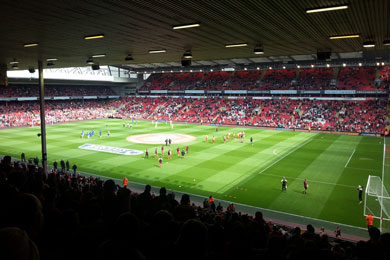By Paul Nicholson
July 5 – Premier League giants Liverpool have announced a pre-season schedule that will see them play in Indonesia, Australia, Thailand, Dublin and Norway – topped and tailed with an opener in nearby Preston and Steven Gerrard’s testimonial game at Anfield, a fixture that has extra special significance since it will also be the first live match aired on the new BT Sport TV channel.
Given its revered history and pedigree, Liverpool attracts fans even if its first team isn’t attracting silverware. The accepted football business wisdom has generally been that to grow a club business globally you have to be winning things – leagues, regional championships and big cup competitions. You can afford to slip occasionally but not for an extended period.
So for Liverpool, a club that has not won its domestic league title since 1989-90, the demand for this iconic brand globally is all the more remarkable. Liverpool, it seems, do not have to pack the trophy cupboard every season to sustain the brand. It simply keeps growing, and, obviously, the business with it.
“We get our revenue in three different buckets,” explains Liverpool CEO Ian Ayre. “Media, which is predominantly part of the centralised deal; the commercial revenues around match days and the stadium that we drive ourselves; and our partnership portfolio, where we have made huge in-roads.”
Liverpool have recent deals in place with Warrior for their kit and Standard Chartered, just starting their second year as shirt sponsor – a sponsorship by a bank that doesn’t have a branch in the UK but is focused on the penetration and profile of its business in Asian markets. Big global partners are taking advantage of the Liverpool FC brand, but there “is a finite level” for these kind of deals, says Ayre.
The areas of opportunity that Liverpool have opened up are in regional partnerships, driven by digital media and social media. “The potential of regional partnerships takes us to new level of deals that are less finite and can be done I pretty much any market,” says Ayre. “We are largely focused on increasing this business. Our deal with Honda in Thailand would be a good example of this.”
“At the forefront of this is the connection through digital media and the social media environment. Local language social media platforms are drawing fans into a deeper relationship with Liverpool Football Club… We have opened 13 new (official) Twitter accounts in nine local languages that have been very effective. It is not just about building websites…it is people on the ground who are really driving this.”
Isn’t this just a vehicle to sell Liverpool shirts? “Merchandise comes further down the line than people think,” responds Ayre. “If you live in Liverpool you have access to everything around the club. We are doing now is making the relationships with fans that are further away stronger.”
Liverpool’s pre-season programme takes in hotbeds of support around the world. As well as the Melbourne sellout, capacity crowds are expected in Jakarta and Bangkok. “People think this is about making money, but we are genuinely giving something back (to overseas fans)… It is also important for our players and managers to understand how big this is. We aren’t like many other clubs,” says Ayre.
If Liverpool are growing internationally, they are also keen to grow at home and have just re-announced plans to extend Anfield to a 60,000 capacity. Ayre is cautious when he talks about the new stadium plans. “The stadium has been on and off in the past. With our owners Fenway Group we had a long look for six months at different option. And then this development came out of left.”
“The council have come up with a major regeneration of the Anfield area that would give us the opportunity to extend and stay in Anfield. We have made some fantastic progress and we really hope we will get there…but it will be a very managed process. What is important for the club is that there is certainty.”
As part of that regeneration the council is purchasing 100 homes that will make way for development that will not just be increasing the capacity of the stadium but will have a new housing component, new shops and restaurants, and a hotel which will also be used as a job re-training centre for the local community.
For Ayre the key thing is to make sure “that what is promised gets delivered”.
Delivering on the pitch is a key part of this as well, and for many fans an increasingly desperate part. But failure to win big trophies hasn’t diminished their numbers or destroyed the business model. If Liverpool is at the forefront of a new business model for ‘big’ club football (that doesn’t require topping leagues and winning cups to be successful), then investing in clubs might no longer be the risky business it is made out to be.
Contact the writer of this story at moc.l1741593381labto1741593381ofdlr1741593381owedi1741593381sni@n1741593381osloh1741593381cin.l1741593381uap1741593381

